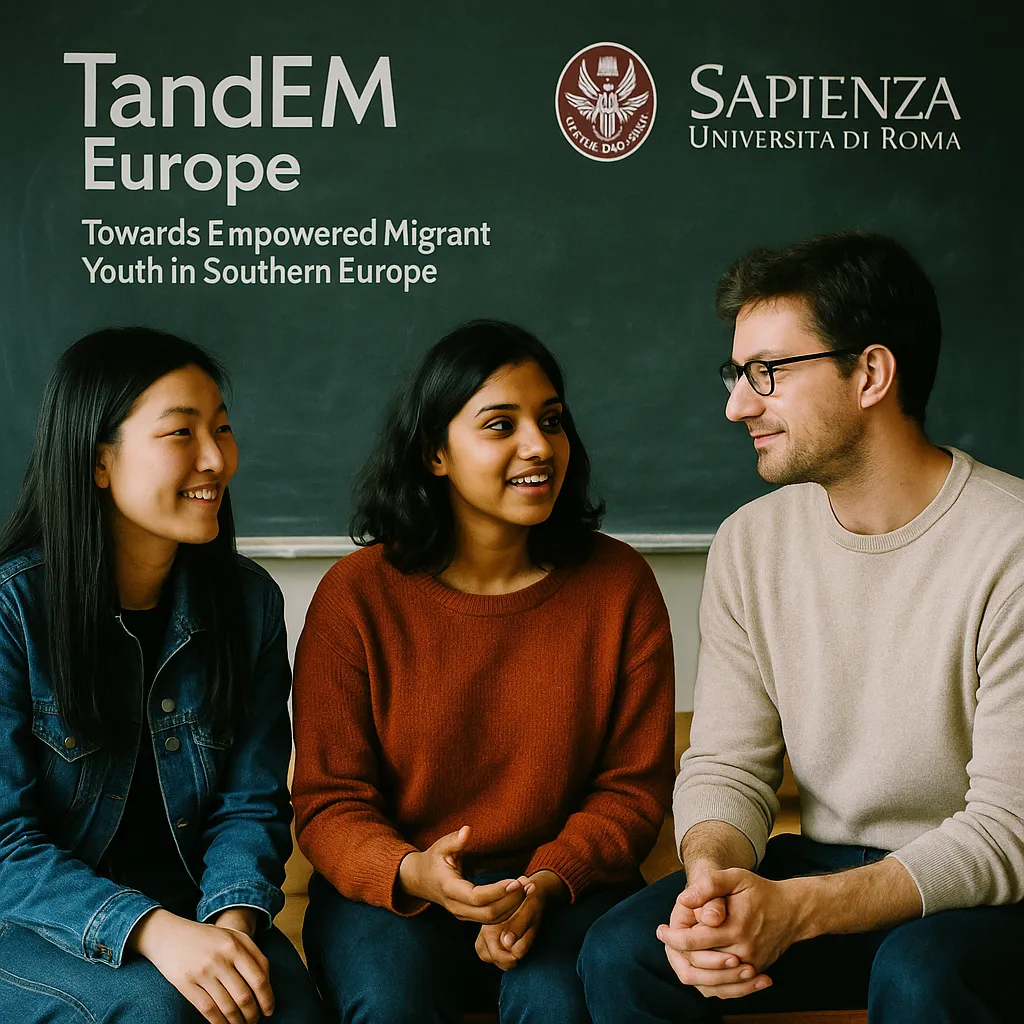Migration isn’t just a political issue—it’s a human journey. In 2025, Europe is still grappling with the practical and emotional weight of this journey, especially for young people. That’s where TandEM Europe steps in. Short for Towards Empowered Migrant Youth in Southern Europe, this EU-supported initiative partners with universities to turn classrooms into gateways of inclusion. And at the heart of its success story stands Sapienza University of Rome, one of Europe’s oldest educational institutions, reimagining what it means to truly welcome migrant students.
What Is TandEM Europe?
Think of TandEM Europe as more than a program—it’s a network of transformation. Funded by the European Union’s Asylum, Migration and Integration Fund (AMIF) and coordinated by the International Organization for Migration (IOM), the initiative targets countries like Italy, Greece, Cyprus, Malta, and Spain—regions heavily affected by migration flows.
But instead of focusing solely on aid or emergency response, TandEM Europe emphasizes education, peer connection, and cultural dialogue. It believes that inclusion isn’t just about policy—it starts where people meet: at school, on campus, in the lecture hall.
Sapienza University: A Living Lab of Integration
Located in the heart of Rome, Sapienza University is not just a participant in TandEM—it’s a frontrunner. The university currently hosts over 4,000 students from migrant backgrounds, including many who arrived in Italy as minors or through family reunification.
To meet their complex needs, Sapienza created the TandEM Integration Desk, a support center offering assistance with legal paperwork, academic credit transfers, and mental health counseling. This is not symbolic help—it’s practical, immediate, and life-changing.
Campus events, faculty training, and peer mentoring have made Sapienza a blueprint for other institutions. Migrant students aren’t just being supported—they’re being empowered to lead.
Eugenio Testa: From Classrooms to Policy Tables
A name that’s become synonymous with this transformation is Eugenio Testa Sapienza. A professor of sociology and migration studies, Testa is more than an educator—he’s a change-maker. He co-founded the Intercultural Mediation Lab, where local and international students collaborate on community projects tied to migration and civic inclusion.
In 2025, Testa also co-authored the influential policy paper Bridges Not Borders: Educational Equity for Migrant Youth in Europe. His arguments now echo in EU-level discussions on reforming university access across member states.
What makes his impact so profound is his philosophy: universities, he says, must be “radically hospitable”—places that don’t just admit students, but actively reshape themselves to reflect the realities of displacement, language difference, and trauma.
The TandEM Framework: A Multi-Layered Model
What makes TandEM Europe effective is its layered approach. It’s not a top-down initiative—it flows in all directions:
1. University Partnerships
- Grants and scholarship programs for undocumented or recently arrived students
- Training modules for faculty on intercultural pedagogy and trauma-informed teaching
- Language support units offering intensive Italian courses and cultural orientation
2. Peer-Based Support
At Sapienza, the TandEM Buddy System matches local students with newcomers. These tandems help with practical things—like registering for classes or finding housing—but often evolve into friendships. This peer-to-peer structure builds mutual respect and bridges social divides.
3. Community Outreach
TandEM also moves beyond campus walls. Public events in cities like Naples and Rome showcase migrant-led storytelling, art, and activism. These aren’t charity projects—they’re platforms where migrants reclaim their voice and shift public perception.
2025 Highlights: What’s New at Sapienza?
Several key moments from 2025 show how the TandEM-Sapienza partnership is growing in impact:
- Intercultural Spring Festival (March 2025): Featuring student performances, poetry, and cuisine from over 20 nations. It was co-organized with Sapienza’s international student union and welcomed over 1,000 attendees.
- Launch of a Legal Aid Clinic: Law students now offer free legal consultations for peers dealing with asylum cases, visa renewals, or family reunification issues.
- “I Am TandEM” Video Series: This storytelling campaign featured real accounts from migrant students like Djamila from Morocco and Ayan from Somalia. These videos are now used in over 50 classrooms and shared across EU digital platforms.
Stories That Prove the Impact
Meet Youssef, a 22-year-old political science student who escaped Libya’s civil unrest. Arriving in Rome alone, he struggled to navigate the university system—until he joined the TandEM mentorship program. His mentor, an Italian student studying international law, helped him adjust and rebuild his academic path. Today, Youssef leads the Sapienza Migrant Youth Club and plans to pursue graduate studies in Brussels.
Then there’s Fatima, originally from Bangladesh, who found her confidence in Professor Eugenio Testa Sapienza’s course on migration theory. “It was the first time I felt like I could speak about my experience—not as a statistic, but as someone with goals,” she shared during a university panel.
These stories remind us that policy alone doesn’t change lives—people do.
Real Barriers, Real Solutions
Of course, it’s not all smooth sailing. TandEM Europe is pushing against some serious headwinds in 2025:
- Credentialing issues: Migrants still face inconsistent recognition of their academic history across EU countries.
- Hostile political climates: Anti-immigration rhetoric continues to challenge public funding and support.
- Funding cycles: With many EU programs tied to short-term grants, long-range planning becomes difficult.
To respond, TandEM is now promoting a European Charter on Migrant Student Inclusion—a shared framework that would mandate consistent support across EU institutions. Unsurprisingly, Sapienza was one of the first to sign on, with Eugenio Testa part of its drafting committee.
Why Education Is the Frontline of Inclusion
At its core, TandEM Europe makes one powerful argument: education is a public good. When you give migrant youth the tools to succeed—whether it’s a laptop, a tutor, or simply someone who listens—you don’t just help one individual. You create ripple effects that lift classrooms, cities, and even governments.
While many headlines still frame migration as a crisis, TandEM Europe tells a different story—one of contribution, collaboration, and co-existence. And that story doesn’t start with statistics. It starts with a desk, a teacher, a student—and a future waiting to be built.

